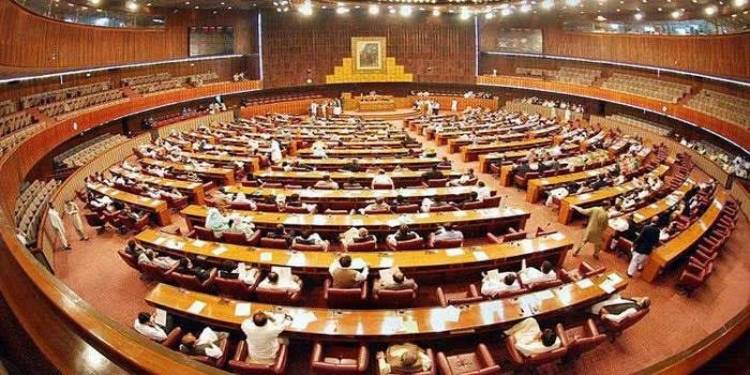
In order to "strengthen the federation," the joint session of the parliament on Monday adopted a resolution emphasizing the simultaneous holding of general elections for the national and provincial assemblies.
Murtaza Javed Abbasi, the federal minister for parliamentary affairs, and Senator Kamran Murtaza introduced two similar resolutions intended to advance political stability and create cooperation among the provinces.
The resolutions supported holding all of the assemblies' general elections simultaneously. In order to ensure impartiality and fairness during the elections, the resolutions highlighted the importance of choosing neutral caretakers.
Additionally, it was contended in the resolutions that holding separate elections in Punjab, the largest federating unit with more than 50% of the National Assembly members, would unavoidably affect the results of general elections for Punjab's National Assembly seats.
The resolutions highlighted that this would potentially diminish the contribution of the smaller provinces to the federation.
Senators from the Pakistan Tehreek-e-Insaf (PTI) protested by staging a symbolic exit from the chamber during the session. The senators from the PTI screamed, "Hold elections and save the country."
The move occurs after the Election Commission of Pakistan’s (ECP) order to delay the poll in Punjab and Khyber Pakhtunkhwa was unanimously deemed "unconstitutional" by a three-judge Supreme Court panel.
The three-member bench, which was led by Chief Justice of Pakistan (CJP) Umar Ata Bandial and included Justices Munib Akhtar and Ijaz Ul Ahsan, also directed the ECP to hold provincial elections on May 14 and requested funding from the federal government to do so.
Originally slated to take place on April 30, the election in Punjab was postponed by the ECP until October 8 due to a recurrence of terrorist attacks, a lack of security personnel, and an unprecedented economic crisis.
The coalition government has already introduced a measure in the National Assembly and Senate regarding funding for general elections, rejecting the ruling of the highest court.
The PTI has criticized the government's action and called the decision to overturn the Supreme Court's ruling "baseless," asserting that the parliament does not have the authority to do so.
Imran Khan, the leader of the PTI, ordered the dissolution of the two assemblies in January as part of his demand that the government holds elections nationwide. PM Shehbaz Sharif, however, has discarded the notion.
Murtaza Javed Abbasi, the federal minister for parliamentary affairs, and Senator Kamran Murtaza introduced two similar resolutions intended to advance political stability and create cooperation among the provinces.
The resolutions supported holding all of the assemblies' general elections simultaneously. In order to ensure impartiality and fairness during the elections, the resolutions highlighted the importance of choosing neutral caretakers.
Additionally, it was contended in the resolutions that holding separate elections in Punjab, the largest federating unit with more than 50% of the National Assembly members, would unavoidably affect the results of general elections for Punjab's National Assembly seats.
The resolutions highlighted that this would potentially diminish the contribution of the smaller provinces to the federation.
Senators from the Pakistan Tehreek-e-Insaf (PTI) protested by staging a symbolic exit from the chamber during the session. The senators from the PTI screamed, "Hold elections and save the country."
The move occurs after the Election Commission of Pakistan’s (ECP) order to delay the poll in Punjab and Khyber Pakhtunkhwa was unanimously deemed "unconstitutional" by a three-judge Supreme Court panel.
The three-member bench, which was led by Chief Justice of Pakistan (CJP) Umar Ata Bandial and included Justices Munib Akhtar and Ijaz Ul Ahsan, also directed the ECP to hold provincial elections on May 14 and requested funding from the federal government to do so.
Originally slated to take place on April 30, the election in Punjab was postponed by the ECP until October 8 due to a recurrence of terrorist attacks, a lack of security personnel, and an unprecedented economic crisis.
The coalition government has already introduced a measure in the National Assembly and Senate regarding funding for general elections, rejecting the ruling of the highest court.
The PTI has criticized the government's action and called the decision to overturn the Supreme Court's ruling "baseless," asserting that the parliament does not have the authority to do so.
Imran Khan, the leader of the PTI, ordered the dissolution of the two assemblies in January as part of his demand that the government holds elections nationwide. PM Shehbaz Sharif, however, has discarded the notion.

